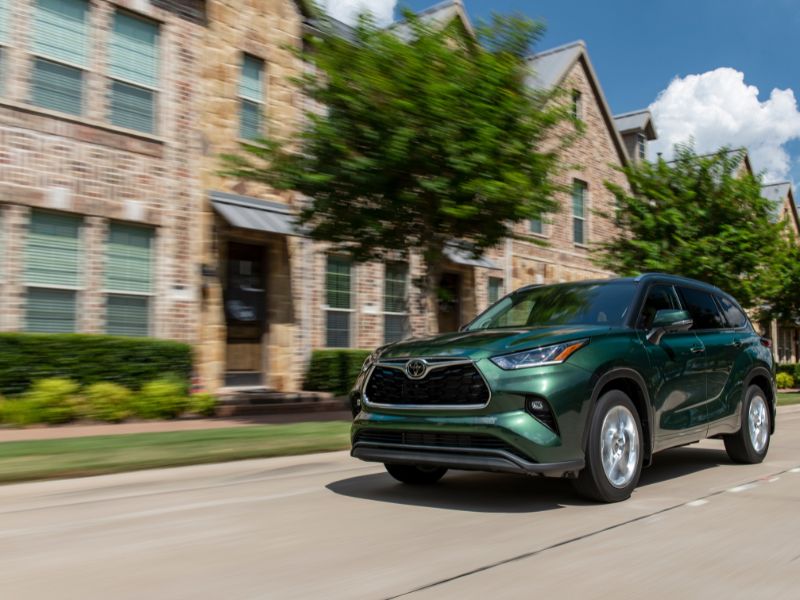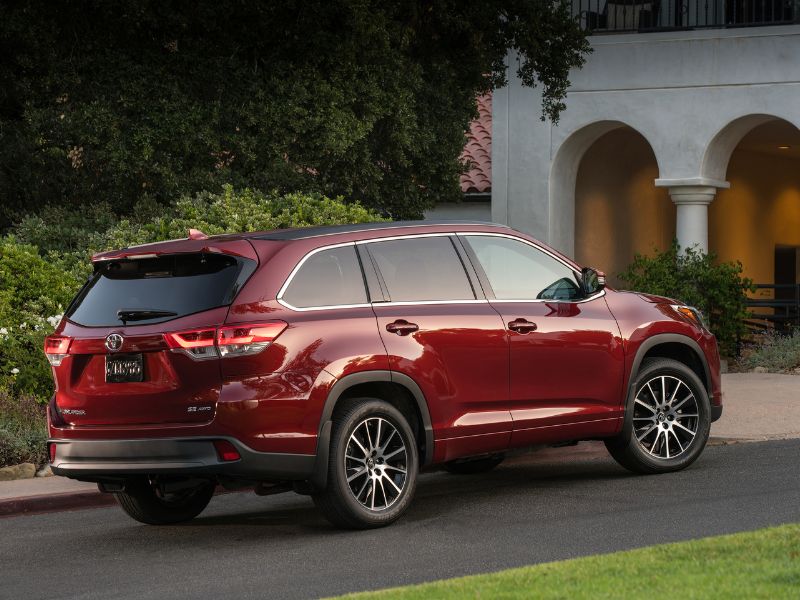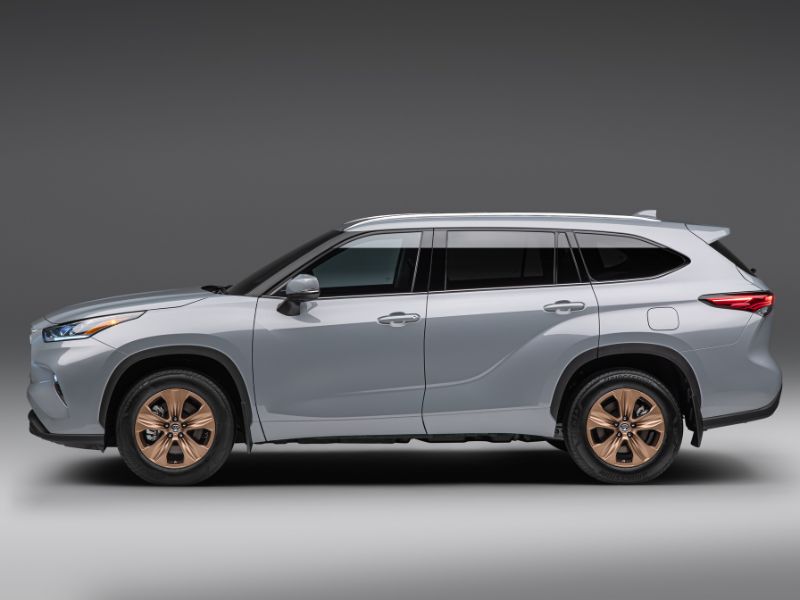The Toyota Highlander is the bigger brother to the Toyota RAV4 and is also a car-based SUV. Models like the Avalon, Camry, and Lexus RX all use the same platform as the Highlander, but the Toyota Highlander has some problems.
The Toyota Highlander suffers from engine block threads stripping, a door chime that stays on, intermediate steering shaft noise, uncomfortable seats, and an infotainment system that randomly resets.
To help you make a more informed decision, we’ve broken down all of these common issues and looked at some Toyota Highlander recalls you need to be aware of (especially if you have one of these models).
Skip ahead:

5 Toyota Highlander Problems To Be Aware Of
1. Engine Block Threads Stripping
The first generation Toyota Highlander, produced from 2001 to 2007, had an issue with the 2.4 liter I4 engine stripping the threads in the engine block that holds the cylinder head.
When it starts stripping the threads of the bolts, the engine can begin leaking coolant or oil either into the cylinder or to the outside of the engine.
If left unattended, the engine can get damaged beyond repair and need an engine replacement that can cost up to $5,000.
This problem usually arises at around 120,000 miles (193,121 kilometers).
If noticed at an early stage, you can fix the problem by installing a helicoil/timesert in the affected bolt holes, as demonstrated in this video:
2. Door Chime Stays On
On the second generation Toyota Highlander (2007-2013), the rear hatch latch switch malfunctions and fails to pick up if the door is closed.
Some owners replaced their latches so a new latch could hold the hatch in more tightly, while others replaced the switch and worked in both cases.
Usually, the problem started appearing only a few thousand miles after purchase and worsened as time passed.
A similar symptom that all owners experienced while turning left or right at moderated speeds, the door chime will start going off, and the cabin light will go on and off.
3. Intermediate Steering Shaft Noise
Third-generation Toyota Highlander owners started hearing and feeling clunking and popping sounds from their vehicle’s steering at around 65,000 miles (104,607 kilometers).
These sounds were due to the universal joints of the intermediate shaft between the steering wheel assembly and the steering rack wearing out.
It is uncommon for most vehicles to experience this sort of failure, especially at this low mileage.
4. Uncomfortable Seats
While it might not leave you stranded or cause a colossal mechanic bill, the third-generation Highlander’s uncomfortable seats are a big talking point between the owners.
Multiple people who test-drove Highlanders opted out of one just due to the bad ergonomics of the seats and instead went for the RAV4 or the bigger Sequoia.
In later years of production, Toyota did semi-rectify it by changing the design of the seats, but the third generation still has the worst front seats in the Highlander series.
5. Infotainment System Random Resets
On the higher specced third generation Highlanders with navigation, the infotainment system randomly will just freeze and reset.
The worst is that you have been using the navigation, which will forget what you put in as the destination and, in most cases, also forget pre-programmed radio station frequencies.
Some owners were lucky that a software update provided by Toyota at the dealership rectified the problem, while others are still in the dark about what is needed to fix the problem.

Toyota 4Runner Recalls
While recalls tend to fix vehicle issues, there is still a chance that some cars never got fixed.
Either the owner did everything DIY or took it to a private mechanic who never knew about the recalls.
So it is advantageous for you as a potential buyer or owner of a Toyota Highlander to learn about these recalls.
And if you already own a 4Runner, take your vehicle to a dedicated Toyota dealer or trustworthy mechanic as soon as possible to rectify these problems.
2004 Recall
- The rear door CPL system (Child Protection Lock) can be knocked into the unlock position when the door is closed very hard, resulting in the door being able to be opened from the inside and increasing the risk of the occupants falling out of the vehicle.
2008 Recall
- 2008 Highlander and Highlander Hybrid models equipped with third-row seating, the automatic locking retractor deactivates before the webbing is fully retracted and causes the belt not to fully retract under everyday driving, causing inadequate child restraint in the event of a crash.
2009 Recalls
- Optional extra stainless steel exhaust tips sold for the 2008 Highlander and Highlander Hybrids models can develop microscopic cracks and cause the clamp to break and fall off the vehicle and cause a road hazard.
- 2008 to 2009, Highlanders were equipped with the wrong load-carrying capacity modification label, thus failing to comply with the FMVSS (Federal Motor Vehicle Safety Standard)
2010 Recall
- 2005 to 2010, Highlanders were equipped with the wrong load-carrying capacity modification label, thus failing to comply with the FMVSS (Federal Motor Vehicle Safety Standard).
2011 Recall
- 2008 Highlander and Highlander Hybrid models may have faulty roll-over sensors that, if failed simultaneously, can cause the roll-over protection to suspend, and the seatbelt pre-tensioners could inadvertently activate and cause injury to the occupants.
2012 Recall
- 2007 to 2009 Highlander and Highlander Hybrid models, the power windows master switch may be assembled in a less precise process, causing the lubricant used to cause malfunction and overheating the switch assembly resulting in the switch melting or even catching fire.
2013 Recalls
- 2009 to 2010 Highlander Hybrid and 2009 to 2013 Highlander models, during modifications by Southeast Toyota Distributors on the seats like; seat covers and seat headrest DVD systems, they might have forgotten to recalibrate the passenger seat occupant sensing system resulting in the system not functioning as indented.
- 2010 to 2013 Highlander and Hybrid models sold by Southeast Toyota were sold outside the allowable one percent of accuracy of the vehicle’s actual weight and failed to comply with the FMVSS (Federal Motor Vehicle Safety Standard).
2014 Recalls
- 2014 Highlander models center third-row seat; the safety belt assembly might not have been appropriately secured on the floor, thus failing to comply with the FMVSS (Federal Motor Vehicle Safety Standard).
- 2013 Highlander models, the second-row left-hand seat may not lock into place when moved to the forward or second adjusting position and can cause occupant injury during a crash and thus fail to comply with the FMVSS (Federal Motor Vehicle Safety Standard).
- 2008 to 2010 Highlander models may damage their Flexible Flat Cable in the spiral assembly inside the steering column assembly resulting in loss of connection to the airbag module. It can lead to the failure to deploy the airbag in a crash.
- 2014 Highlander and Hybrid models may have improper software installed in the airbag electronic control unit, causing a larger front passenger not to be adequately restrained during a crash resulting in failing to comply with the FMVSS (Federal Motor Vehicle Safety Standard).
- 2014 Highlander models, the second-row right-hand seat may not lock into place when moved to the forward or second adjusting position and can cause occupant injury during a crash and thus fail to comply with the FMVSS (Federal Motor Vehicle Safety Standard).
- 2014 Highlander models may have a fuel leak at one of the fuel delivery pipes in the engine compartment, which can increase the fire risk.
- 2006 to 2011 Highlander models may experience excessive seat cushion compression that can damage the seat heater wiring resulting in an electrical short and further causing burning and injury.
2015 Recalls
- 2015 Highlander and Hybrid models, while manufacturing a component of the electric power steering electronic control unit, may have been damaged, causing power steering failure over time.
- 2008 to 2011 Highlander and Hybrid models, the power windows master switch may be assembled in a less precise process, causing the lubricant used to cause malfunction and overheat the switch assembly resulting in the switch melting or even catching fire.
2016 Recalls
- 2005 to 2011 Highlander models may experience excessive seat cushion compression that can damage the seat heater wiring resulting in an electrical short and further causing burning and injury.
- 2016 Highlander models sold by Southeast Toyota Distributors may have a Load Carrying Capacity Modification Label that does not show the correct added weight of the vehicles, thus not complying with the FMVSS (Federal Motor Vehicle Safety Standard).
- 2016 Highlander models may not have their brake fluid level sensor connected to the wiring harness preventing the sensor the measure the level of the brake fluid, thus failing to comply with the FMVSS (Federal Motor Vehicle Safety Standard).
2017 Recalls
- 2017 Highlander and Hybrid models may have a spare wheel tire pressure that is not adjusted as stated on the tire pressure label.
- 2017 Highlander and Hybrid models sold by Gulf States Toyota with roof rail cross bars, the fasteners may not have been correctly torqued, resulting in the cross bars coming loose and becoming a road hazard.
2018 Recalls
- 2017 to 2018 Highlander models may have incorrect load-carrying capacity labels, thus failing to comply with the FMVSS (Federal Motor Vehicle Safety Standard).
- 2018 Highlander models, the oil galley in the rotor of the brake booster may have been incorrectly machined and can lead to sudden loss of brake assist.
- 2014 to 2018 Highlander models have an attached wiring harness that water can leak into, damaging the vehicle’s ECM (Engine Control Module).
2019 Recall
- 2019 Highlander models, the writing on the load capacity label can become illegible, thus failing to comply with the FMVSS (Federal Motor Vehicle Safety Standard).
2020 Recalls
- 2017 to 2019 Highlander models, the low pressure in the tank fuel pump may fail, resulting in the engine stalling while driving and increasing the risk of a crash.
- The 2020 Highlander model equipped with the 3.5 liter V6 engine may have the Engine Control Unit supply the engine with the incorrect amount of fuel during the start/stop function, resulting in the vehicle stalling.
- 2020 Highlander and Hybrid models may be installed with incorrect seat trim covers on both front seats, preventing the seat-mounted airbag from deploying properly.
2022 Recalls
- 2020 to 2022 Highlander Hybrid models, the skid control ECU may not activate the VSC (Vehicle Stability Control) system after the vehicle is restarted after driving with VSC disabled, thus failing to comply with the FMVSS (Federal Motor Vehicle Safety Standard).
- 2022 Highlander and Hybrid models, the writing on the load capacity label can become illegible, thus failing to comply with the FMVSS (Federal Motor Vehicle Safety Standard).
Recall information provided by National Highway Traffic Safety Administration

Final Thoughts On Toyota Highlander Problems
With all these problems, it is still a desirable SUV in the Toyota stable, as are their other models like the RAV4 and 4Runner, which also has minor issues compared to brands like Ford with their Escape which suffers from many more problems.
The best thing to do if you own a Toyota Highlander is to take it to a Toyota dealership and have them check for any recalls that haven’t been completed.
If you are in the market for a used 4Runner, get a full vehicle history report and avoid any models with an outstanding recall.
Hopefully, you found this article helpful, and you can go to your next Toyota Highlander test drive knowing what to look out for.
FAQs
Is The Toyota Highlander A Reliable Car?
Yes, only the first generation available from 2001 to 2007 had an issue with the 2.4-liter gasoline engine where the engine block threads for the cylinder head would strip. Overall the Highlander is highly praised by its owners and gives little to no mechanical problems; it even received a rating of 82 out of 100 for quality and reliability from J.D. Power ratings.
What Is The Best Year Model Toyota Highlander?
The year model Highlanders that are the best models to buy are from 2001, 2007, 2009, and 2017 onwards. These year’s models have the least complaints in forums and at the NHTSA.
Do Toyota Highlanders Have Transmission Problems?
No, overall, the only experiences owners of the Highlander are very positive. Only a handful mentioned the transmissions being delayed shifts and very few incidents of the transmission grinding or causing the car to shake.

